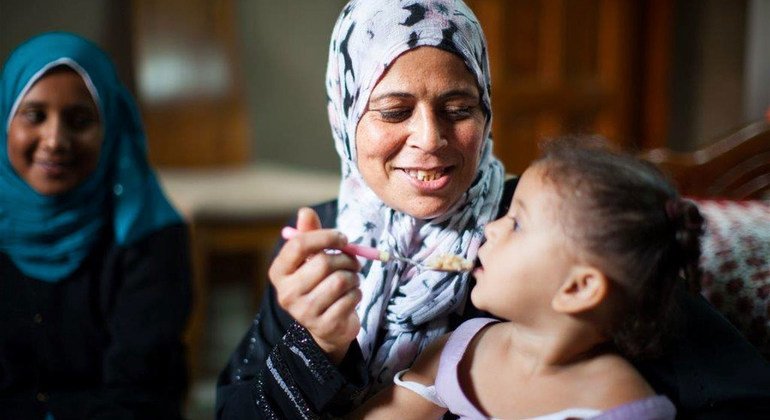
To combat malnutrition and iron deficiency in Gaza and the West Bank, the World Food Programme (WFP) on Friday, launched a campaign to provide support to hundreds of pregnant and nursing women.
Through community-based and online initiatives, the campaign will accelerate and support “a knowledge-sharing process”, according to Samer AbdelJaber, WFP Representative and Country Director.
At individual, household, and community levels, activities such as cooking classes, home-garden kits, and training – on growing vegetables and fruits for example – are being rolled out via social media platforms and through on-site awareness sessions.
Dietary boosts
According to the World Health Organisation (WHO), iron deficiency has become a significant public health problem in Palestine, especially among children under five.
Sessions designed for mothers with young children, pregnant and nursing women, provide information on iron-rich foods and anaemia prevention.
They also include ‘edutainment’ activities, discussions with nutritionists and cooking sessions on preparing healthy, iron-fortified meals.
Through this campaign, WFP will support mothers and families in improving their nutrition while also boosting iron intake.

WFP/Wissam Nassar
The World Food Programme (WFP) has launched a campaign to combat malnutrition and iron deficiency in pregnant and nursing women in Palestine.
Combining health with fun
Social and Behaviour Change Communication, or SBCC, combines elements of interpersonal communication, social change, advocacy, and community engagement, to support individuals and families, adopt and maintain more nutritious eating patterns.
Using the SBCC approach, WFP is conducting a “grow your own garden” initiative, which will include more iron-rich vegetables.
“These activities will encourage participants to make healthy food and lifestyle choices for themselves and their families, contributing to improving their overall nutritional status”, according to the UN agency.
Inspiring people
In Palestine, WFP provides food assistance to the most vulnerable people through in-kind food and cash-based transfers.
It also supports long-term resilience via targeted training, and skills-focused job opportunities.
“Through hands-on initiatives and harnessing the power of technology, we work together to build a process that ultimately aims not just to share information but to inspire people to apply it to their everyday activities”, said Mr. AbdelJaber.